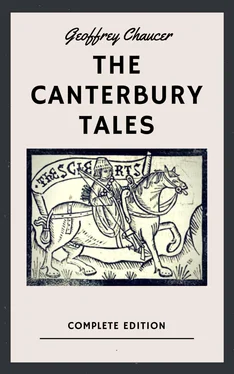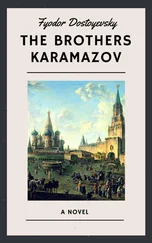77. Made an O: Ho! Ho! to command attention; like "oyez", the call for silence in law-courts or before proclamations.
78. Sarge: serge, a coarse woollen cloth
79. Heart-spoon: The concave part of the breast, where the lower ribs join the cartilago ensiformis.
80. To-hewen and to-shred: "to" before a verb implies extraordinary violence in the action denoted.
81. He through the thickest of the throng etc.. "He" in this passage refers impersonally to any of the combatants.
82. Galaphay: Galapha, in Mauritania.
83. Belmarie is supposed to have been a Moorish state in Africa; but "Palmyrie" has been suggested as the correct reading.
84. As I came never I cannot telle where: Where it went I cannot tell you, as I was not there. Tyrwhitt thinks that Chaucer is sneering at Boccacio's pompous account of the passage of Arcite's soul to heaven. Up to this point, the description of the death-scene is taken literally from the "Theseida."
85. With sluttery beard, and ruggy ashy hairs: With neglected beard, and rough hair strewn with ashes. "Flotery" is the general reading; but "sluttery" seems to be more in keeping with the picture of abandonment to grief.
86. Master street: main street; so Froissart speaks of "le souverain carrefour."
87. Y-wrie: covered, hid; Anglo-Saxon, "wrigan," to veil.
88. Emily applied the funeral torch. The "guise" was, among the ancients, for the nearest relative of the deceased to do this, with averted face.
89. It was the custom for soldiers to march thrice around the funeral pile of an emperor or general; "on the left hand" is added, in reference to the belief that the left hand was propitious — the Roman augur turning his face southward, and so placing on his left hand the east, whence good omens came. With the Greeks, however, their augurs facing the north, it was just the contrary. The confusion, frequent in classical writers, is complicated here by the fact that Chaucer's description of the funeral of Arcite is taken from Statius' "Thebaid" — from a Roman's account of a Greek solemnity.
90. Lyke-wake: watching by the remains of the dead; from Anglo-Saxon, "lice," a corpse; German, "Leichnam."
91. Chaucer here borrows from Boethius, who says: "Hanc rerum seriem ligat, Terras ac pelagus regens, Et coelo imperitans, amor." (Love ties these things together: the earth, and the ruling sea, and the imperial heavens)
THE MILLER'S TALE.
THE PROLOGUE.
When that the Knight had thus his tale told
In all the rout was neither young nor old,
That he not said it was a noble story,
And worthy to be *drawen to memory*; *recorded*
And *namely the gentles* every one. *especially the gentlefolk*
Our Host then laugh'd and swore, "So may I gon,* *prosper
This goes aright; *unbuckled is the mail;* *the budget is opened*
Let see now who shall tell another tale:
For truely this game is well begun.
Now telleth ye, Sir Monk, if that ye conne*, *know
Somewhat, to quiten* with the Knighte's tale." *match
The Miller that fordrunken was all pale,
So that unnethes* upon his horse he sat, *with difficulty
He would avalen* neither hood nor hat, *uncover
Nor abide* no man for his courtesy, *give way to
But in Pilate's voice<1> he gan to cry,
And swore by armes, and by blood, and bones,
"I can a noble tale for the nones* *occasion,
With which I will now quite* the Knighte's tale." *match
Our Host saw well how drunk he was of ale,
And said; "Robin, abide, my leve* brother, *dear
Some better man shall tell us first another:
Abide, and let us worke thriftily."
By Godde's soul," quoth he, "that will not I,
For I will speak, or elles go my way!"
Our Host answer'd; "*Tell on a devil way*; *devil take you!*
Thou art a fool; thy wit is overcome."
"Now hearken," quoth the Miller, "all and some:
But first I make a protestatioun.
That I am drunk, I know it by my soun':
And therefore if that I misspeak or say,
*Wite it* the ale of Southwark, I you pray: *blame it on*<2>
For I will tell a legend and a life
Both of a carpenter and of his wife,
How that a clerk hath *set the wrighte's cap*." *fooled the carpenter*
The Reeve answer'd and saide, "*Stint thy clap*, *hold your tongue*
Let be thy lewed drunken harlotry.
It is a sin, and eke a great folly
To apeiren* any man, or him defame, *injure
And eke to bringe wives in evil name.
Thou may'st enough of other thinges sayn."
This drunken Miller spake full soon again,
And saide, "Leve brother Osewold,
Who hath no wife, he is no cuckold.
But I say not therefore that thou art one;
There be full goode wives many one.
Why art thou angry with my tale now?
I have a wife, pardie, as well as thou,
Yet *n'old I*, for the oxen in my plough, *I would not*
Taken upon me more than enough,
To deemen* of myself that I am one; *judge
I will believe well that I am none.
An husband should not be inquisitive
Of Godde's privity, nor of his wife.
So he may finde Godde's foison* there, *treasure
Of the remnant needeth not to enquere."
What should I more say, but that this Millere
He would his wordes for no man forbear,
But told his churlish* tale in his mannere; *boorish, rude
Me thinketh, that I shall rehearse it here.
And therefore every gentle wight I pray,
For Godde's love to deem not that I say
Of evil intent, but that I must rehearse
Their tales all, be they better or worse,
Or elles falsen* some of my mattere. *falsify
And therefore whoso list it not to hear,
Turn o'er the leaf, and choose another tale;
For he shall find enough, both great and smale,
Of storial* thing that toucheth gentiless, *historical, true
And eke morality and holiness.
Blame not me, if that ye choose amiss.
The Miller is a churl, ye know well this,
So was the Reeve, with many other mo',
And harlotry* they tolde bothe two. *ribald tales
*Avise you* now, and put me out of blame; *be warned*
And eke men should not make earnest of game*. *jest, fun
Notes to the Prologue to the Miller's Tale
1. Pilate, an unpopular personage in the mystery-plays of the middle ages, was probably represented as having a gruff, harsh voice.
2. Wite: blame; in Scotland, "to bear the wyte," is to bear the blame.
Whilom there was dwelling in Oxenford
A riche gnof*, that *guestes held to board*, *miser *took in boarders*
And of his craft he was a carpenter.
With him there was dwelling a poor scholer,
Had learned art, but all his fantasy
Was turned for to learn astrology.
He coude* a certain of conclusions *knew
To deeme* by interrogations, *determine
If that men asked him in certain hours,
When that men should have drought or elles show'rs:
Or if men asked him what shoulde fall
Of everything, I may not reckon all.
This clerk was called Hendy* Nicholas; *gentle, handsome
Of derne* love he knew and of solace; *secret, earnest
And therewith he was sly and full privy,
And like a maiden meek for to see.
A chamber had he in that hostelry
Alone, withouten any company,
Full *fetisly y-dight* with herbes swoot*, *neatly decorated*
And he himself was sweet as is the root *sweet
Of liquorice, or any setewall*. *valerian
His Almagest,<1> and bookes great and small,
His astrolabe,<2> belonging to his art,
His augrim stones,<3> layed fair apart
On shelves couched* at his bedde's head, *laid, set
His press y-cover'd with a falding* red. *coarse cloth
Читать дальше












